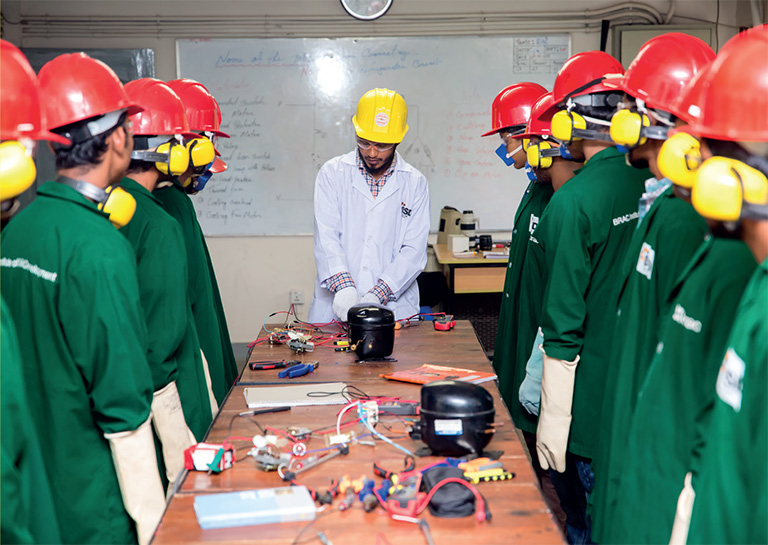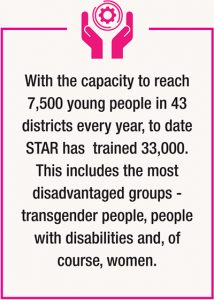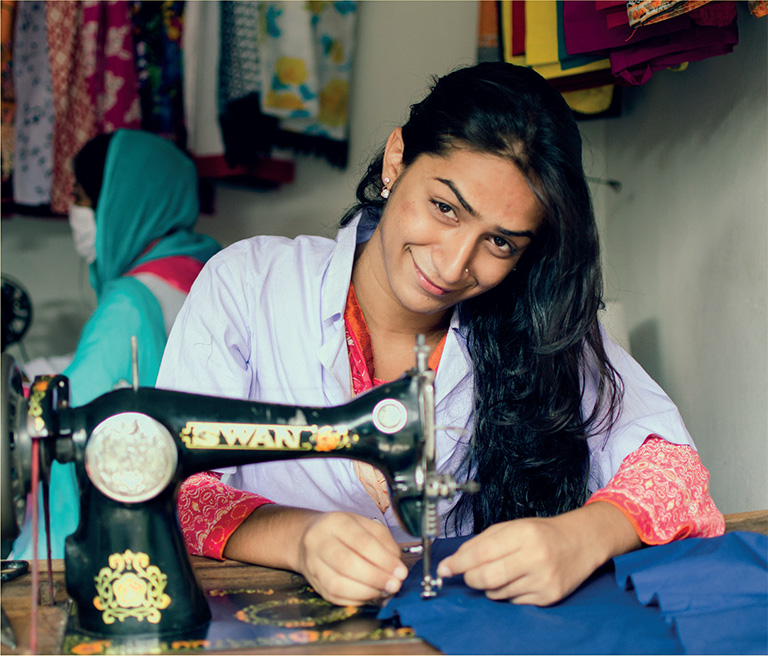Real-life heroes: Using skills to flip the script

Skilling the world’s youngest continent
March 24, 2019
Pushing the envelope, securing the paycheck
March 24, 2019Real-life heroes: Using skills to flip the script

Not far from the world’s largest mangrove forest lives a young woman with a confident smile. “I’ll give you quality refrigerator maintenance if you live close by,” 21 -year-old Sumia says with pride in her lilting accent distinct to Bangladesh’s deep southwest.
Sumia’s native district of Satkhira is known for its religious conservatism. Abandoned by her father, and the eldest of seven children, she had to grow up sooner than she should have. Just two years ago, 19-year-old Sumia was unable to support her large family with her ninth-grade education as she had no employable skills. With the help of BRAC’s skills development programme (SDP), Sumia has come a long way in a short time.
Her story is a beating-the-odds tale of perseverance, tenacity and grit. And SDP wants to work with thousands like her to write their own tales of triumph.
Today, Sumia has a gaggle of customers who wait for her time to get their fridges repaired. She provides for her entire family and dreams of having a small electrical repairing shop of her own. Fully aware of the importance of a proper education, Sumia is adamant that her younger brothers and sisters will not have to give up school like she did.
In the rural outskirts of Saidpur in northern Bangladesh, a young Alamgir runs a cell phone servicing outlet. The 17-year-old’s upper lip displays a thin trace of a new moustache and his face breaks into a shy smile at compliments which come frequently because of his sincere work.
Alamgir has never had the use of his legs, which was why he could not continue school after sixth grade. His classroom had shifted to the first floor of the school building and climbing two flights was, at the time, an insurmountable obstacle.
He is now more independently mobile. But Alamgir would probably have spent the rest of his life as a burden to his old mother and a brother who is a wage labourer if he had not found an alternative means of acquiring skills.
His situation, like that of thousands of young men with similar disabilities, seemed beyond remedy, but that was a year ago.
Today he goes to the town market to buy accessories and equipment and is greeted with the respect given to valuable clients.
Sumia and Alamgir embody the spirit of what the skills development programme strives to achieve.
Equipping teenage school dropouts and persons with disabilities with hands-on training and respectable jobs is difficult as it is. Getting a transgender person an apprenticeship at a market is no mean feat in Bangladesh’s context.
But what is even more challenging is to place a woman in a male-dominated vocation. SDP is about nurturing and supporting the Alamgirs and Sumias of Bangladesh.
It is about enabling everyday heroes to overcome odds, shatter stereotypes and move from the margins to the mainstream.

Context
The importance of skills training – through SDP’s apprenticeship programme – leading to successful job placement needs to be viewed in the context of Bangladesh. Here 2.2 million young people enter the workforce every year while 2.68 million people over the age of 15 remain unemployed.
To make matters worse, two of every five young people in Bangladesh are neither employed nor in any kind of education or training. On top of that, women, who constitute half the population, account for just over a third (36 per cent) of the labour force.
Three out of every four girls who drop out of school are forced into child marriage. The informal sector of the economy accounts for 85 per cent of employment.
It is against this backdrop that SDP’s 95 per cent job placement and almost two- thirds reduction in child marriage stand out.
Apprenticeship
 Behind each story lies rigorous study that went into the birth of skills training for advancing resources (STAR), an apprenticeship-based training programme with job placement. STAR remains SDP’s flagship initiative to this day.
Behind each story lies rigorous study that went into the birth of skills training for advancing resources (STAR), an apprenticeship-based training programme with job placement. STAR remains SDP’s flagship initiative to this day.
STAR began in 2012 to provide youth with employable skills sets. It provides hands-on training along with theoretical knowledge to dropouts between 14 and 18 years of age. What sets STAR apart from similar training programmes is its successful job placement and meticulous chaperoning at every step of the way. This raises operation costs but provides for a long-term and sustainable means of livelihood for participants. The six-fold rise in income of learners often means that their families graduate out of poverty.
STAR’S success has led to a number of other programmes with the same core standards, principles of social inclusion and placing youth in decent workplaces. These include promoting skills and productivity enhancement for resilience (PROSPER), which is similar to STAR but attempts to generate revenue by charging partial training fee, targeting people who are more well-off.
Value chain development
Pro-poor growth of rural enterprises through sustainable skills development (PROGRESS) catalyses the development of small, light engineering enterprises and provides business development skills. Besides this value chain development using upward market linkages, the programme utilises BRAC’s successful apprenticeship experience to support 5,000 enterprises, train 10,000 youth, half of who are women. The light engineering sector is strengthened through these partnerships while the youth gain employable skills.
Business incubation
Having grown up in poverty and always under the strict presence of her father, Keya’s prospects of running her own beauty salon seemed like fantasy. But after her apprenticeship, the fiesty graduate started working at the same salon where she trained.
Despite tripling her salary, Keya wanted to own a salon of her own.
So she bought one.
Promoting incubation support to enterprises (PROMISE) helps small entrepreneurs with business incubation. Open to aspiring entrepreneurs, the programme is a natural next step for STAR graduates. PROMISE includes activity-based classroom training and tailored mentoring support.
Institutional training
These projects deal mainly with the burgeoning non-formal sector which accounts for the bulk of employment. These vocations do not have a systematic regulation of permits and licences. Apprenticeship remains an effective means of securing employment.
In sectors where certification is valued, BRAC’s Institute of Skills Development (BRAC-ISD) provides the necessary support.
The institute trains people over 18 years of age in high-demand occupational skills, with a special focus on training potential migrants, women and persons with disabilities.
The institute also arranges for assessment and accreditation of learners and ensures employment in domestic or overseas jobs. It has a system in place that recognises prior learning through assessment of the competency level of workers, especially from disadvantaged backgrounds, who lack necessary academic qualifications. The initiative ensures that BRAC reaches a wider demographic and is not limited to teenage dropouts or extremely disadvantaged groups.

Rising to the challenge
Moushumi and Habiba’s fortunes would have been markedly different had it not been for the Rohingya influx of 2017.
They are two of the 100 learners in an SDP pilot scheme among the host communities of Cox’s Bazar that saw incomes plummet during the crisis.
The SDP initiative combined several approaches that proved effective – every single learner found a job. Within a few months of the influx, there was high demand for semi-skilled people with basic education.
Moushumi got a job as an IT operator at an NGO office in a refugee camp and Habiba, who trained as a beautician, has already become an instructor for another NGO-run course.
Given the success of these programmes in the south-eastern coastal district, UNICEF and WFP are funding SDP projects for host communities and Myanmar nationals inside the camps, respectively.
Paperless operations
At the core of SDP operations lies a commitment to technology. The TaroWorks app covers every aspect of the apprenticeship programmes and has been a major factor behind the success of STAR and its sister projects. TaroWorks ensures real-time monitoring of all field operations in minute detail. This has reduced the amount of paperwork, saving time and energy for field officers as well as their managers.
Distinctly different
Although an overwhelming portion of unemployed youth are dropouts and the non-formal sector accounts for the bulk of employment, popular interventions do not target either of these spaces.
SDP gives dropouts a second chance and a shot at gainful employment by leveraging the potential of Bangladesh’s large non-formal sector.
Alamgir, Sumia, Keya, Moushumi, Habiba and thousands of others like them are the real heroes who brave adversity to change their own lives.
Mahenaw Wara is a programme manager for BRAC Skills Development Programme.

